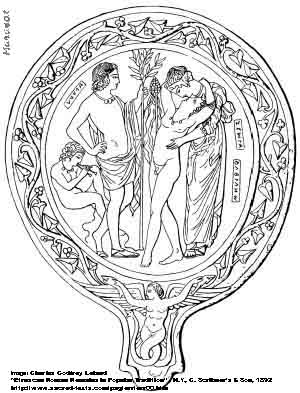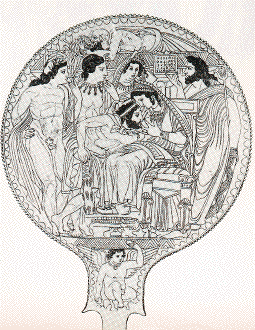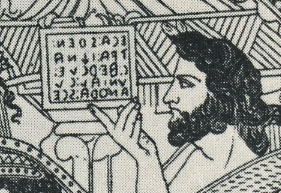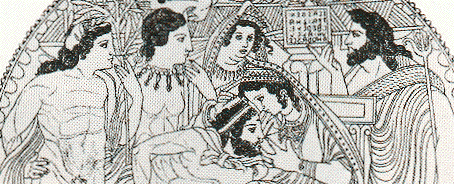Translation of the Etruscan mirror from Volterra, Uni Suckling Heracles

Etruscan Phrases
by Mel Copeland
(from a work published in 1981)
The Mirror of Uni Suckling Heracles, Script AH
with script SF, mirror of Dionysus, Semele and Apollo
This is the translation of the tablet in the mirror:
AH-1 this is, behold serene? they are accustomed?
AH-3 the two here in this place the born
AH-6 Hercules
AH-9 the goddess Uni there, CLA?
AH-9 the young married girl / daughter-in-law? you know
This mirror falls into the category of "illustrated Etruscan literature," where the text is expected to coincide with the illustration, as in the case of the Icarius Mirror, MS 565/2 and the "Battle of the Amazons." The mirror was found in Volterra and is in the Museo Archeologico, Florence. The illustration of the mirror is from "The Etruscans," Massimo Pallotino, Indiana University Press, 1975.
The story being told here, according to the myth passed down from the Greeks and Romans involves Hera's jealousy over her husband's philandering. In the case involving Heracles, Hera had attempted to prevent Heracles' mother, Alcmene, from giving birth at the time prophesied by Zeus. Zeus announced one day on Olympus that a son of his lineage was about to be born and was fated to become lord of his people. This meant, as Hera knew, that if Zeus' son by Alcmene were to be born at the proper time, he would succeed to the rule of Tiryns that his grandfather had held. She therefore tricked her unwary husband into decreeing that whatever descendant of his was born that day would rule. As soon as he had pronounced the words, Hera dispatched their daughter Eileithyia, a goddess of childbirth, to Thebes to retard the delivery of Alcemen's child. Meanwhile, in Thebes Alcmene had been seven days in labor with twins in her womb. Some believe that Hera, not content with depriving her child on his throne, wanted to kill him, and his mother as well. Eileithyia was preventing the birth by sitting on her altar by the door of the bedroom with legs and fingers tightly crossed. At the same time Hera saw to it that a son would be immediately born at Tiryns to the wife of Sthenelus, who had usurped the throne that should have belonged to Amphitryon. As a grandson of Zeus' son Perseus, this boy, Eurystheus, was guaranteed by Zeus' vow the rule of Tiryns and Mycenae. Zeus was furious at Hera, but could not revoke his oath.
Alcmene's Theban attendants had almost given up hope for her life when one of them – a woman named Galanthis, or a daughter of Teiresias named Historis – thought of a way to break the spell. She cried out happily that the baby was born. The astonished Eileithyia leaped to her feet, uncrossing her legs and fingers. In the moment before the goddess discovered the deception, twins were born to Alcmene. The frustrated Eileithyia punished Galanthis by changing her into a weasel. Alcmene and Amphitryon named their children Heracles and Iphicles. (Some say that Heracles was originally christened Alcaeüs. It soon became clear that one of the twins was the son of Zeus, the other Amphitryon.
Hera continued her persecution of Heracles. She next sent two snakes to the crib where the brothers, no more than eight or ten months old, lay sleeping. Iphicles screamed in terror, but Alcaeus grabbed the snakes by the throat and strangled them. Amphitryon was no longer in doubt as to which child was the god's. According to some writers, it was Amphitryon himself who had placed the snakes in the crib in order to settle once and for all his own doubts.
According to some traditions Zeus tricked Hera into giving Heracles suck while she slept. The Milky Way was caused by the spilled milk when she woke to discover the trick. On discovering that she was suckling a hated rival's child, she tore the infant from her breast, allowing the milk to squirt across the sky.
Angrier than ever, Hera deprived Heracles of his birthright and tried to cause his death even in the crib. Failing in this, she pursued him throughout his life, causing him endless hardships and destructive madness. Some claim that the goddess reared the Nemean lion, the Hydra, and teh Eearthborn monsters of Bear Mountain to be Heracles' enemies. When he was finally taken up to heaven, Hera was reconciled to him and even consented to his marriage to her daughter Hebe, but she did not neglect to punish Philoctetes for granting Heracles' dying request that he set a torch to his pyre.*
The Etruscan version of this story, as shown in the mirror, shows Heracles as a grown man suckling at Hera's (Uni's) breast. Behind Uni is Zeus (Tini) who is holding a writing tablet. We do not know who the woman behind Uni is, but she is shielding Uni with her robe. Neither do we know who the two young men are. The fellow holding the "tree," possibly the tree of life, appears to be the same character in the mirror from Tuscania, Script DL, who holds a branch pointing down at his feet. Script DL involves a prophesy where the augur reading a liver tells Tarquin to "fear." The characters beside the augur are: (right) the god Feltune (FEL TVNE), (left) Tarquin, holding a staff, and on either side of Tarquin are two young men, one of whom holds a plant, or tree of life. Above the head of the young man with the tree is the word(s): RARLR. If the two young men in script DL are the same as those in this mirror, the scene seems to convey the revelation of knowledge. In this latter scene Uni (Hera) is not supposed to be aware that Heracles is at her breast. Tini (Zeus) would likely be pointing this out to those looking at the scene.
Adonis or Apollo?
The fellow with the plant, or tree, in any case may be Adonis who is a Greek hero of Asiatic origin. Adonis was said in the Catalogues of Women to be the son of Phoenix and Alphesiboea. Apoollodorus calls him a son of Cinyras, king of Paphos, in Cyprus, by his wife, Metharme, daughter of Pygmalion. A more usual tradition makes him the son of a n incestuous union of Cinyras or Theias, king of Assyria, with his daughter, named Myrrha or Smyrna. For not giving due honor to Aphrodite (Etr. Turan) the girl was punished by the goddess with an uncontrollable love for her father. Myrrha satisfied her desire with the help of her nurse and became pregnant. When the father learned what had happened, he pursued the girl with a sword. The gods changed her into a myrrh tree, which split open in due course, revealing the infant Adonis inside.
According to one version of the story, Aphrodite, on seeing that the child was beautiful, put him secretly into a chest and entrusted him to Persephone's (Etr. Phersipnei) keeping. Persephone looked into the chest and, finding the boy as attractive as Aphrodite did, refused to give him up. Aphrodite referred her case to Zeus (Etr. Tini), who decreed that Adonis should spend a third of the year with each goddess and have the remaining third for himself. He chose to spend his free time with Aphrodite.
 |
|
Script SF, -1 Apollo, -2 Flufluns and -3 Semele
|
Followers of Adonis' cult mourned his death in part by planting "gardens of Adonis" which were green plants seeded in shallow soil that sprang up quickly and quickly withered.
Apollo was widely worshipped by the Etruscans, based upon the artifacts that have come down to us, such as the Apollo of Veii, one of the more famous representations of the god. There are drawings of Etruscan mirrors that show Apollo (Etr. APVLV), such as this one from Leland's work (1892) [See sacred-texts.com], which shows him holding a tree in the presence of Semele and Dionysus (Etr. FLVFLVNS). Apollo was a defender of the Trojans during the Trojan War and was worshipped for his gifts of prophesy, medicine, music, and wisdom. He was the protector of the ways to dwellings and streets (Apollo Agyïes) to whom the Argonauts prayed, as a protector of shores and embarcations. As a healer Apollo tipped the scale when he restored a dead man to life. Furious Zeus blasted him with a thunderbolt for his presumption. Apollo was so furious over Zeus' action against him he killed the Cyclopes, who furnished Zeus with his thunderbolts.
He is recognized as a sun god, Phoebus Apollo, much after the aspects of the ancient sun god, Helios. He was also worshipped under the epithet, "Smintheus," said to refer to him as protector against mice and plagues but others attribute the title to being the god of the city of Sminthe, in the Troad. Another epithet, Lyceius, suggests either the "Wolf-god" or "Light-god," but also may refer to the god of the Lycians. Some scholars have traced his name to Apulunas, a Hittite god. The ephitet, "Smintheus," may be an epithet, PERSNIPHMV, in the Tavola Eugubine, Scripts N, Q and R.
Heracles had murdered Iphitus, some say because he doubted Heracles had stolen Eurytus' mares. In a fit of rage Heracles threw Iphitus from the walls of Tiryns and as a result was cursed with a terrible disease which could be cured only when he permitted himself to be sold into slavery. Not liking this alternative, he sought the advice of his brother, Apollo, who also was fathered by Zeus. (Apollo was born to the Titaness Leto, along with his sister, Artemis, on the island of Delos; Apollo's main sanctuary was in Delphi and Artemis' was in Delos.) However, when Heracles went to Delphi to seek Apollo's advice the Pithia refused to answer. Heracles thereupon snatched the sacred tripod and threatened to set up an oracle of his own. After somewhat of a squabble between the two, Zeus intervened by throwing a thunderbolt and Apollo then gave Heracles the advice he sought.
Apollo had many loves, male and female. He gave Priam's daughter, Cassandra, prophetic gifts to buy her favors. When she still refused he condemned her always to go unheeded (this being one of the causes of the Trojan War). Then there was the Cumaean Sibyl's rash wish for as many years as there were grains in a pile of sand. He then offered to grant her youth, without which the first gift would be merely an affliction, if she would accept him as a lover. She refused and became a decrepit thousand years old. Apollo pursued the nymph Daphne, but she became a laurel bush rather than submit ot him. He had to content himself with killing Leucippus, a young rival, and making the laurel his sacred plant. Daphne, whose name means "laurel," was the daughter of the Thessalian river-god Peneius. She loved to hunt with other girls along the banks of the Ladon River and seeing her there, Leucippus, son of Oenomaus, king of Elis, fell in love with her. But she would have nothing to do with men. Leucippus then dressed up as a girl and asked to be allowed to hunt with the her. Her new friend showed great prowess in the hunt. One day the girls thought to go for a swim in the Ladon and invited him to join them. He refused but they stripped him anyway, only to discover his sex. They were so infuriated they killed him, according to this version of the story. Some say that Apollo caused this to happen because he wanted Daphne for himself.
In the main story involving Daphne and Apollo, it was Eros who shot an arrow at Daphne, causing her to reject male advances. She persuaded her father to let her be a virgin forever, but Apollo would not let himself be denied. He persued Daphne through the woods until, seeing that she could not escape, she prayed to Ge for help. The goddess transformed her into a laurel tree. The frustrated god had to content himself with breaking off a branch to wear on his head. Thereafter the laurel was sacred to Apollo.
Thus, the characters whom Zeus is addressing in Script AH below are Uni, Heracles, Apollo, and two others who have yet to be identified. Apollo's participation in the scene of Heracles being suckled also is obscure. This mirror, like other Etruscan mirrors, such as the Icarius mirror, Script M565/2, carries a more complex scene in its portrayal than that which has come down to us from the Romans and Greeks.
Likewise is the connection of Apollo to the story of Semele and Dionysus (Etr. FVFLVNS). Dionysus, the god of wine growing, was born from another liason of Zeus, this time with the daughter of Cadmus, king of Thebes, and Harmonia. When Semele conceived Hera became jealous. She tricked Zeus into appearing as the storm god with Semele and she was consumed by the lightning. Hermes snatched her child, Dionysus, from the womb and sewed it into Zeus' thigh, from which in due course of time it was born. At the end of his wanderings (from varied places, such as India and Egypt), Dionysus descended into Hades and brought his mother up to Olympus under the name Thyone. Another story says that Dionysus was a son of Zeus and Persephone who was dismembered and eaten by the Titans. But Zeus saved his torn heart and served it to Semele in a drink, by which she became pregnant. Another story shows Semele and her son being locked in a chest and thrown into the sea. When the chest came ashore at Briae, Semele was dead, but her son was alive and was nursed in a cave there by his aunt Ino. Thus, Semele was identified by the Greeks with the mother of the Egyptian god Osiris (who was locked in a chest and thrown into the sea by his brother Set). She is believed to have been related to the Phrygian earth-goddess Zemelo. Perhaps Apollo, following the Etruscan version of the story, was influential in bringing Semele back to life? The worship of Dionysus, of course, involved not only wine but music, which would be the principal connection of Apollo to the mirror of Semele.
AH-1--ECA: SeREN: [Translation: this is (It. ecco, adv.) serene (It. sereno, m.; adj. serene, possibly an adverb, quietly, serenly) or alternatively, they are accustomed (L. sueo)]
AH-3 TFA: IK NAC: (C from line AH6) [Translation: she regards/watches over (L. tueor [or tuor] tueri, tuitus and tutus, dep. and tueo-ere) or alternatively, the two (L. duo-ae-o; It. due; Fr. deux; Welsh, dau, dwy; Gr. Dyo; Persian, do) – See K152, which is in the context: E NESCI TFA, from (L. e, ex) the ignorant (L. nescio-ire, not to know, to be ignorant; nescius-a-um, not knowing, ignorant, unaware) two, or she did not know the two] See also K171 – E NESCI.
Note: NAC is used at: Z263, Z432, Z1227, Z1591, Z1623, Au-41, Au53, Au74, L15, V-3
IK is used at: Z540, Z761, Z1192, Z1310, Z1359, Z1591, Z1647Thus, lacking a precedent, IKNAC, separated by punctuation marks, itself would not appear to be a word. See also Z1021, "SeREN TFE NVN RENeR." and Z1846, SeREN TFE TEI, "serene you watch, regard (L. tueo-ere) or alternatively, "serene the two gods (L. dii)..." Thus, TFA, TFE appears to work in both contexts as a verb or a number. The context of Z1021 leads to the phrase, "you are three" : Z1027, ES TREI.
AH-6 HERCLE: [Translation: Hercules (L. Hercules-is, m.)]
AH-7 VNIA Le: CL (CL is part of AH-9) [Translation: the (goddess) Uni there / to her (Fr. le, la) he calls] Note: VNIA is gen. case for Uni, seen at Au13 as well. Unia is mentioned at Au13 in the context of a parallel Punic text referring to Ishtar. CaL connects to A in AH-9 based on script Z usage. See Etruscan GlossaryA.xls.
AH-9 (CaLA) NORA: SCE [ the young married woman/daughter-in-law (L. nurus-us, f.; It. nuora, f.) you know (L. scio, scir, scivi or scli, scitu). An alternate form could be CLANvRA]
Note: Since we know Uni (Hera) awakes surprised at Heracles suckling her breast, this scene portrays the moment she awakes, when in theory the milk is spilled. On her lap is a blanket apparently intended to prevent any milk from getting on her garments. The people watching the scene appear either angered or surprised but Tini (Zeus) must have a look of revenge, since he is getting back at Uni (Hera) for having attempted to kill his son.
VNIA – Uni is usually spelled, VNI; however, sometimes the suffix "ia" is applied to names and so far it appears to be a neuter suffix, being applied to both males and females. The suffix, "ei," however, appears to apply to feminine names, as in Phersipnei and Elenei. The god Tinia's name is found written as TINI and TINIA as well. Helen's name, Elenei, as seen at MM-1, is also spelled with the "ai," as seen at DM-8.
A god holding the tablet also holds a staff which Tini the supreme god (Jupiter/Zeus) carries in the divine_mirror html. Uni (Greek, Hera) has a woman (possibly Alcmene) behind her whose robe is draped over Uni's shoulder. The young  man with a crown of Laurel leaves
man with a crown of Laurel leaves was thought to be Iphicles, but the plant suggests that it is Apollo. Below the panel, as is common in Etruscan mirrors, is a cherub or angel. This one is holding up an egg. The egg appears in Etruscan funerary banquet scenes and is a symbol of rebirth. The egg in this scene is strange.
was thought to be Iphicles, but the plant suggests that it is Apollo. Below the panel, as is common in Etruscan mirrors, is a cherub or angel. This one is holding up an egg. The egg appears in Etruscan funerary banquet scenes and is a symbol of rebirth. The egg in this scene is strange.
Heracle's mother, Alcmene, was married to Amphitryon, son of Perseus' son Alcaeüs. The couple had to flee to Thebes. Amphitryon then led a military expedition against the Taphian Islands. While he was away Zeus secreted himself in Alcmene's chamber and impregnated her. Through lots of turns and twists in the story Alcmene gave birth to twin sons, Alcaeüs, or Heracles, and Iphicles. Alcmene exposed the baby Heracles for fear of Hera's anger and Athena found and persuaded the unsuspecting Hera to suckle him. Hera did so until he bit her. Athena then returned him to his mother and persuaded her to raise her own child.
We cannot identify the figure next to Apollo (the figure holding the tree).There are other versions which show Hera asleep, suckling Heracles, and when she woke up the milk spilled and formed the Milky Way.
For a closer look at the mirror click on image:

*Myths from "The Meridian Handbook of Classical Mythology," Edward Tripp, 1970.
![]() Please send me back to Etruscan_Phrases index
Please send me back to Etruscan_Phrases index
Updated: 9.16.06; 12.27.06
Copyright © 1981-2007 Maravot. All rights reserved.
Copyright © 1981-2007 Mel Copeland. All rights reserved.
Use of the information on this page for publication in any media is expressly forbidden without the prior written consent of the author.